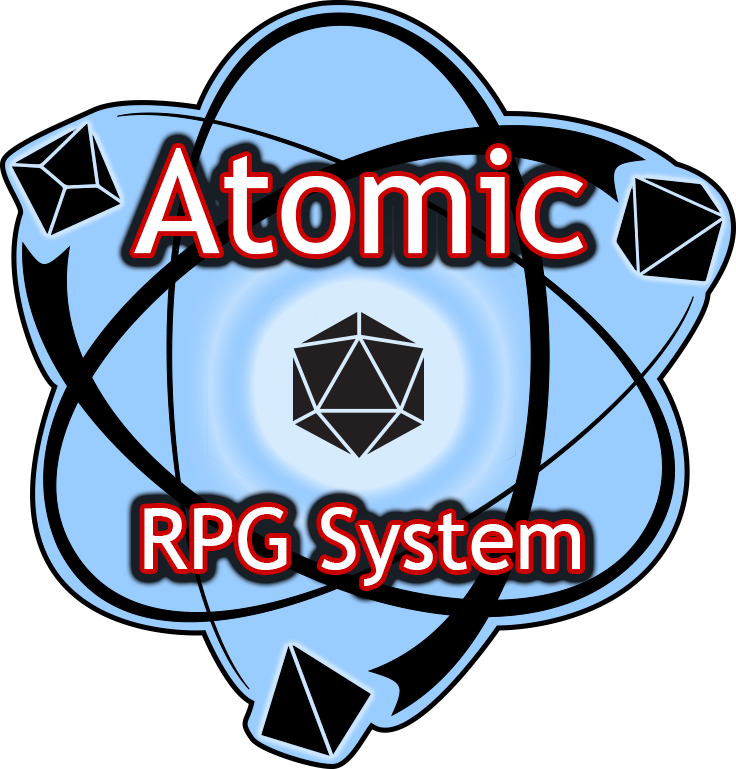Atomic RPG System Character Archetypes
Like Dungeons and Dragons and many other role playing games, the Atomic RPG System system uses classes of characters to begin to narrow down what kind of Atomic RPG System character will be created. In the Atomic RPG System system, they are called Character Archetypes. There are only three Archetypes to choose from in the Atomic RPG System, unlike other role play games. This makes character creation much simpler! You don’t have to figure out the nuanced differences between a fighter, ranger, paladin, monk, barbarian, or great weapon fighter.
Once players begin to truly conceptualize their character, it is time to start making some real character building decisions. Then we will look deeper and deeper into a character, narrowing it down even more. Using this progression, players will be able to make the character they want, with Powers befitting their character concept, and their desired Specialties and magic items. With this approach, players will be invested in their character from the start. It’s this investment that will make the character fun to play and memorable.
The first step to make a character is deciding what kind of character you’d like to play. Characters will be able to have a variety of talents, so don’t get too hung up on everything you want to do. Instead think about what the character’s primary Archetype is going to be. In the Atomic RPG System there are three main character archetypes: Combatant, Mystic, and Generalist.
Build Bonuses will be given depending on the choices. Unlike the rest of the Atomic RPG System Bonuses, Build Bonuses will stack. Bonuses such as Power Bonuses, Item Bonuses, and Specialty Bonuses will not stack with the bonus type of the same name.
The Archetypes are described in detail below.
Combatant
Fighter(ish)
Primary focus on combat abilities.
Examples might include a sword master, sniper, or brawler that focuses on being a martial expert.
Combatants are warriors who are devoted to fighting skills. These combatants primarily fight with weapons versus spells or guile. They are accomplished in hand-held weapons, hand to hand combat, and ranged combat.
- A Combatant’s primary Trait is Body.
- Primary Discipline will be Combatant which will determine the Effects of the Powers that can be used.
- Combatants are generally experts in weapons of all kinds. Hand to Hand weapons (Melee) Missile Weapons (Ranged)
- As a Combatant you will be able to add your Character Level to Combatant Powers as Build Bonus Damage.
- Classic examples of a Combatant are: fighter, barbarian, monk, paladin, mercenary, and sniper.
If the character you want to play is a weapons or combat expert, a Combatant is probably right for you.
Generalist
Rogue(ish)
Primary focus on skills and utility abilities.
Examples might include a rogue, a bard, or hacker that likes to use skills and buffs to aid or harm others.
The Generalist uses experience, quick wit, and charming personality. They can still be deadly warriors, though they prefer to use other methods such as stealth, intrigue, and manipulation. They rarely limit themselves to one Discipline. This gives them many different talents.
- A Generalist’s primary Trait is Spirit.
- Primary Discipline will be Generalist, which will determine the Effects of the Powers that can be used.
- Generalists are generally experts at Skills and Powers that Heal or grant Bonuses and Penalties. They tend have a broader range of Power and abilities. Able to heal and buff allies. Able to use many Skills well.
- As a Generalist you will be able to add your Character Level to Generalist Powers as a Build Bonus to Skills.
- Classic examples of generalists are bards, smugglers, rogues, scouts, and warlords.
If the character you want to play is good at many Skills or hindering enemies, a Generalist is probably right for you.
Mystic
Wizard(ish) / Cleric(ish)
Primary focus on magic or supernatural abilities.
Examples might include a sorcerer, psionisist, or cleric that uses the mysterious unseen forces of the mind and magic.
Mystics are devoted to the power of the gods, the mind, or the magic of the weave. Instead of being a physical character, a Mystic channels supernatural powers to aid allies or attack enemies.
- A Mystic’s primary Trait is Mind.
- Primary Discipline will be Mystic, which will determine the Effects of the Powers that can be used.
- Mystics are generally experts in supernatural or mental Powers. These include magic, psionic, godly powers, and supernatural powers.
- As a Mystic you will be able to add your Character Level to Mystic Powers as Build Bonus to Damage if you choose an Aggressive Style or to Healing if you choose a Neutral or Protector Style character.
- Classic examples of a Mystic are clerics, mages, wizards, sorcerers, necromancers, and medics.
If the character you want to play is good at many Supernatural abilities, a Mystic is probably right for you.
One of these three choices will be the Archetype of the character. This is the foundation of the character and will help to determine the strength of this character in many different ways. This represents the core of the character. From here players will pick secondary abilities.
